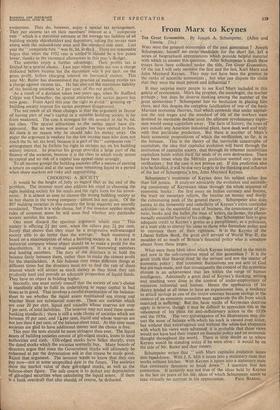From Marx to Keynes
WHO were the greatest economists of the past generation ? Joseph Schumpeter, himself no mean candidate for the short list, left a series of biographical appreciations which provide helpful material with which to answer this question. After Schumpeter's death these essays have been collected under the title, Ten Great Economists. Of the ten I will only mention the first and the last, Karl Marx and John Maynard Keynes. They may not have been the greatest in the ranks of scientific economists ; but who can dispute the claim that they were the most potent and influential ?
It may surprise many people to see Karl Marx included in this galaxy of economists. Marx the prophet, the sociologist, the teacher perhaps ; but does he deserve ranking among the number of the great economists ? Schumpeter has no hesitation in plating him there, and this despite the complete falsification of one of the basic Marxian economic theories, that which contends that under capital- ism the real wages and . the standard of life of the workers were destined to inevitable decline until the ultimate revolutionary explo- sion would sweep capitalism away. The facts of history, the rows of cars outside any American industrial plant, have dealt well and truly with that particular prediction. But there is another of Marx's basic economic propositions of which the verification, so far, is in the balance. This is the theory of the inevitable catastrophe of capitalism, the idea that capitalist evolution will burst through the institution of capitalist society, that through its inherent instabilities capitalism holds within itself the seeds of its own destruction. There have been times when the Marxian prediction seemed very close to verification ; but the case is not proven yet. If this predictibn also is to be falsified, it will be due very largely to the thinking and influence of the last of Schumpeter's ten, John Maynard Keynes.
Schumpeter's treatment of Keynes does his subject rather less than full justice. It analyses admifably the evolution and astonish- ing consistency of Keynesian ideas through the whole sequence of economic books : the first essay on Indian currency and finance, the tract on monetary reform, the treatise on money and finally the culminating peak of the general theory. Schumpeter also does justice to the immensity and catholicity of Keynes's extra curriculai activities—as the successful man of business, the connoisseur of pic- tures, books and the ballet, the man of letters, the farmer, the pheno- menally successful bursar of his college. But Schumpeter fails to give adequate credit to Keynes's genius as a pamphleteer, as a politician, as a man able to convey his ideas to those who formulate policy and to convince them of their rightness. It is the Keynes of the Liberal Yellow Book, the great civil servant of World War II, the moulder of so much of Britain's financial policy who is somehow absent from these pages.
What were these basic ideas which Keynes implanted in the minds and now in the sub-conscious mind of this generation ? It is the great truth that finance must be the servant and not the master of economic policy ; that economic fluctuations are not acts of God but are man-made, and that consequently the control of thb economic climate is an achievement that lies within the range of human intelligence. Admittedly a great deal of Keynes's thinking, writing and teaching were done in the context of under-employment of resources industrial and human. Hence the application of his theory tended at all times to have an expansionist bias, a tendency to attack savings as one of the major enemies because savings in the context of an economic recession must aggravate the -ills from which mankind is suffering.' But the basic truths of Keynesian doctrine apply in reverse, though it may be difficult to appreciate this in the vehemence of his pleas for anti-deflationary action in the •1920s and the 1930s. The very extravagance of his illustrations may dis- tort the sense of balance with which his work is viewed even today, but without that extravagance and without the white-hot eloquence with which his views were advanced it is probable that those views would not have had their impact on financial policy and on economic thought throughout the world. There is little doubt as to where Keynes would be standing today if he were alive : it would be on the side of Mr. Butler and dear money.
Schumpeter writes that " with Marx capitalist evolution issues into breakdown. With J. S. Mill it issues into a stationary state that works without hitches. With Keynes it issues into a stationary state that constantly threatens to break down." I question that last contention. It certainly was not true of the ideas held by Keynes in the last six years of his life, ideas of which Schumpeter seems to take virtually no account in his appreciation. PAUL BAREAU.


















































 Previous page
Previous page